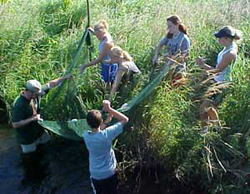The Camp Program Handbook includes the Michigan 4-H Youth Code of Conduct and 4-H Great Lakes & Natural Resources Camp Rules. All participants, volunteers and staff members are expected to abide by the code of conduct, the event rules and all other MSU regulations in order to attend this program. Everyone involved in this camp must sign an agreement stating they’ve read, understand and agree to the Michigan 4-H Code of Conduct and program rules in order to be allowed to participate in the program.
What's the 4-H Great Lakes Natural Resources Camp Schedule Like?
Camp begins with check-in from 3 to 4 p.m. on Sunday and ends with campers' departure at 11 a.m. on Saturday. Here's a tentative daily schedule:
| 7 a.m. | Wake-Up (optional early morning activities include fishing, polar bear swim, running and bird watching) |
| 8 a.m. | Breakfast |
| 8:30 a.m. | Camp and Personal Area Clean Up |
| 9 a.m. | Great Lakes Ecology Exploration Sessions (attend a different session each day) |
| Noon | Lunch |
| 12:45 p.m. | Announcements, Group Meetings, Personal Time |
| 1:30 p.m. | Recreation Learning Options |
| 3:30 p.m. | Swimming and Beach Activities |
| 5:30 p.m. | Supper |
| 7 p.m. | Group Recreation |
| 8:15 p.m. | Evening Program |
| 9:15 p.m. | Snack |
| 9:30 p.m. | Campfire |
| 11:15 p.m. | Curfew – Campers Must Be in Their Assigned Cabins |
Examples of Great Lakes Ecology Exploration Sessions

- Maritime Heritage & Shipwrecks – All aboard the glass-bottom boat! Each camper will cruise the Thunder Bay National Marine Sanctuary waters in an area known as 'shipwreck Alley' to discover the history that lies below. Become a maritime archaeologist for the day as you explore the immersive exhibits at the Great Lake Maritime Heritage Center to learn how scientists use modern technology to study this unique area of Lake Huron and why it claimed so many ships.
- Climate Change – Learn about climate change, its effects on Lake Huron, the Great Lakes coastlines and surrounding systems while exploring woods, wetlands and waterways. This session lets youth act as climatologists for a day collecting data from local ecosystems to better understand long-term climate patterns while exploring Great Lakes and natural resource habitats of northeast Michigan.
- Forestry and Wildlife –We need trees and forests for food, shelter, healthy soil and clean air and water. Wildlife has the same needs! Explore some special forest communities of Northern Michigan and how they are managed for timber, wildlife and recreation. Find and identify wildlife while exploring the habitats where they live. Learn how to keep our forest healthy and productive for both humans and wildlife.
- Watersheds & Marine Debris – Study water samples, explore an inland lake from aboard a boat, and learn about the freshwater version of marine biology! Collect mud from the lake bottom using scientific equipment; see what pollutes our lakes and learn ways to help protect our waters. Discover how micro-beads, shampoos, cleaners and plastics are creating environmental concern and a call for action.
Recreation Learning Options
Your choices include, but are not limited to, archery, crafts, hiking, canoeing, photography, a sea lamprey research presentation, rock and fossil hunting at a local quarry, lighthouse tour, outdoor survival, orienteering and swimming enhancement for those who can’t swim well or at all. Strong swimmers will also have the chance to go kayaking, sailing and snorkeling.
What to Bring . . . And What NOT to Bring to Camp
Be sure to label everything you bring to camp with your name.
| Definitely bring the following items with you to camp: | Consider bringing the following items with you to camp: |
|
|
| Leave the following items at home: |
|
Directions to Camp
Camp Chickagami is located along Lake Huron in the northeast corner of the Lower Peninsula in Presque Isle (between Rogers City and Alpena.)




 Print
Print Email
Email